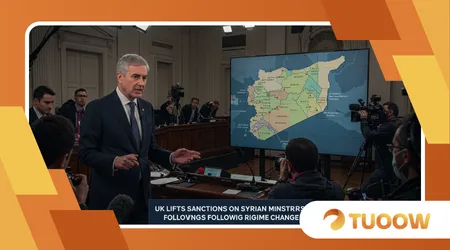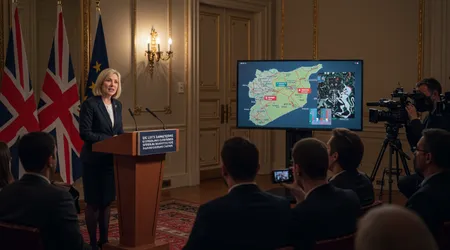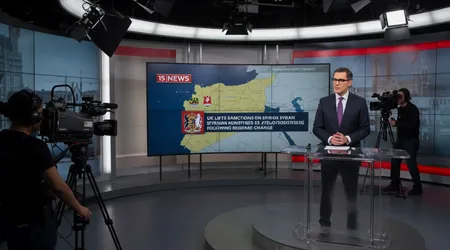UK Lifts Sanctions on Syrian Ministries Following Regime Change

UK Lifts Sanctions on Syrian Ministries in a historic move, signaling a pragmatic shift in British foreign policy after Bashar al-Assad’s fall.
Announced on April 24, 2025, this decision targets Syria’s defense and interior ministries, alongside intelligence agencies, aiming to support economic recovery and regional stability.
But is this a calculated step toward rebuilding a shattered nation, or does it risk empowering a government with ties to controversial groups?
This article dives into the implications, motivations, and potential outcomes of this policy shift, blending hard facts with sharp analysis.
The collapse of Assad’s regime in December 2024, led by Hayat Tahrir al-Sham (HTS) and opposition forces, marked a turning point for Syria.
With 90% of Syrians living in poverty, according to a 2025 UN study, the need for economic revival is urgent.
Britain’s decision reflects a cautious optimism, but it’s not without critics who question the timing and beneficiaries.
Let’s unpack the layers of this complex move, from diplomatic signals to on-the-ground realities.
Why Now? The Context Behind the Decision
Britain’s choice to UK Lifts Sanctions on Syrian Ministries comes four months after Assad’s ousting, a period marked by Syria’s fragile transition.
The HTS-led government, despite its controversial past, has shown efforts to stabilize the country.
For instance, dissolving Assad-era spy agencies in January 2025 signaled a break from repressive tactics. This aligns with Britain’s stated goal of fostering a government that protects all Syrians.
The timing also reflects economic desperation. Syria’s GDP has halved since 2011, per UN data, crippling infrastructure and public services.
By lifting asset freezes, Britain aims to enable institutions like the defense ministry to function, potentially stabilizing security forces.
Imagine a house gutted by fire removing sanctions is like clearing debris to rebuild, though the blueprint remains unclear.
Yet, critics argue this move is premature. HTS remains a proscribed terrorist group in the UK, raising concerns about legitimizing its rule.
++ New TV Drama Revisits Jean Charles de Menezes Case After 7/7 Attacks
The question lingers: does this policy reward reform or overlook risks?
Diplomatic pressures also play a role. The EU and UK have engaged HTS leaders, urging inclusive governance.
Lifting sanctions signals trust in these talks, but without US alignment, the impact may be limited.
Syria’s new leaders have arrested Palestinian Islamic Jihad officials, hinting at concessions to Western demands.

Economic Recovery: A Glimmer of Hope or False Dawn?
The UK Lifts Sanctions on Syrian Ministries to jumpstart Syria’s economy, a nation where one in four is jobless.
Unfreezing assets of the defense and interior ministries could fund salaries and services, easing public hardship.
In March 2025, Britain unfroze the Central Bank of Syria’s assets, a precursor to this broader policy.
Consider a practical example: a Syrian teacher, unpaid for months, could receive a salary if state institutions regain liquidity.
Also read: Publication of Foreign Criminals Awaiting Deportation Sparks Political Debate
This trickle-down effect might stabilize communities, encouraging refugee returns.
Prime Minister Keir Starmer’s spokesperson noted the sanctions lift, effective April 25, 2025, aims to “promote regional stability.”
However, the economic impact hinges on global coordination. The US maintains banking sanctions, limiting money transfers.
As Chris Doyle of the Council for Arab-British Understanding told Middle East Eye, without US action, Britain’s move is symbolic. It’s like fixing one wheel of a broken cart progress, but incomplete.
Skeptics also point to HTS’s governance capacity. Managing a war-torn economy requires expertise, not just funds.
The risk of mismanagement looms, potentially undermining Britain’s intentions.
Read more: The Safest and Most Dangerous Cities in the UK: (2025)
Security and Stability: A Double-Edged Sword
By enabling the UK Lifts Sanctions on Syrian Ministries, Britain seeks to bolster Syria’s security framework.
A functional defense ministry could unify armed factions, reducing sectarian violence.
For example, March 2025 clashes in Alawite regions killed hundreds, highlighting the need for centralized control.
The table below outlines key entities delisted from UK sanctions:
| Entity | Former Role | Sanction Lift Date |
|---|---|---|
| Ministry of Defense | Military operations | April 24, 2025 |
| Ministry of Interior | Internal security | April 24, 2025 |
| General Intelligence Directorate | Intelligence and surveillance | April 24, 2025 |
Yet, security gains are uncertain. HTS’s integration of Turkish-backed Syrian National Army factions is superficial, per researcher Alexander McKeever.
Without full control, rogue groups could destabilize efforts. It’s akin to herding cats possible, but chaotic.
Public sentiment, reflected in X posts, shows cautious support. @SyriaNewsMan hailed the move as progress, but others fear it empowers HTS.
Balancing security and accountability remains a tightrope walk for Britain.
The sanctions lift also raises questions about chemical weapons. Syria reportedly has over 100 such sites, per a 2025 New York Times report.
A strengthened defense ministry could secure these, but oversight is critical to prevent misuse.
Geopolitical Ripples: A New Middle East Dynamic?
The UK Lifts Sanctions on Syrian Ministries reshapes regional alliances. Assad’s fall weakened Iran and Hezbollah, allies reliant on Syrian support.
Britain’s policy signals a pivot toward engaging Syria’s new rulers, potentially countering Russian influence, as Moscow seeks to retain its bases.
Israel’s actions in the Golan Heights, post-Assad, add complexity. A stable Syria could reduce cross-border tensions, but HTS’s past ties to extremist groups worry Jerusalem.
Britain’s move might encourage dialogue, yet it risks alienating allies if perceived as hasty.
Globally, the policy tests Western unity. The US, under Trump’s administration, monitors HTS cautiously, per a March 2025 Reuters report.
Conditions like destroying chemical weapons and excluding foreign fighters in governance are non-negotiable. Britain’s unilateral action could strain transatlantic ties.
Public discourse on X reflects mixed sentiments. @MiddleEastEye emphasized normalization, while @redstreamnet criticized the timing amid HTS’s alleged atrocities.
This divergence underscores the policy’s polarizing nature.

Humanitarian Impact: Rebuilding Lives or Raising Hopes Too Soon?
At its core, the UK Lifts Sanctions on Syrian Ministries aims to alleviate human suffering.
With 11,000 Syrians fleeing to Lebanon since March 2025 violence, per UN data, stability is critical for refugee returns.
Unfrozen assets could fund schools and hospitals, rebuilding lives.
Take a hypothetical Syrian family: parents displaced in Turkey might return if jobs and safety improve. Britain’s policy bets on this domino effect, amplifying March’s $6.5 billion donor pledge in Brussels.
Yet, sectarian tensions, like Alawite killings, threaten progress.
The humanitarian lens also exposes risks. Sanctions relief without oversight could enrich elites, not citizens.
Historical examples, like Iraq post-2003, show aid often fuels corruption. Britain must ensure transparency to avoid this trap.
Engagement with HTS leaders, as seen in UK-HTS talks, suggests a pragmatic approach. But can a group with a terrorist label deliver inclusive governance?
This question haunts policymakers and Syrians alike.
The Road Ahead: Opportunities and Pitfalls
What does the future hold after the UK Lifts Sanctions on Syrian Ministries? Optimists see a path to stability, with Syria rebuilding under a reformed government.
The appointment of diverse ministers, like Alawite Yarub Badr, signals inclusivity, per Al Jazeera’s March 2025 report.
Yet, pitfalls abound. HTS’s terrorist designation complicates normalization. Without US sanctions relief, economic recovery stalls.
Britain’s move, while bold, needs global backing to succeed. It’s like planting a seed in rocky soil nurture is everything.
Public skepticism, voiced on X by @MarioNawfal, warns of HTS’s violent tactics.
Balancing engagement with accountability is Britain’s challenge. Transparent monitoring of delisted entities could build trust.
The policy also invites reflection. Why rush to lift sanctions when HTS’s intentions are unclear?
This rhetorical question underscores the gamble Britain takes, hoping reform outweighs risks.
Conclusion: A Leap of Faith in Uncertain Times
The UK Lifts Sanctions on Syrian Ministries is a watershed moment, blending hope with hard realities.
Britain’s decision, rooted in economic and security imperatives, aims to rebuild a nation scarred by 14 years of war.
With 90% of Syrians in poverty, the stakes are monumental. Yet, the shadow of HTS’s past and the absence of US alignment cast doubt on its success.
This policy is a leap of faith, like a tightrope walker trusting the rope holds. Britain must navigate HTS’s intentions, regional rivalries, and humanitarian needs with precision.
The world watches, wondering if this move sparks Syria’s revival or fuels new tensions.
Only time will reveal the outcome, but for now, Britain has chosen action over inaction.
Frequently Asked Questions
1. Why did the UK lift sanctions on Syrian ministries?
The UK Lifts Sanctions on Syrian Ministries to support economic recovery and stability post-Assad, enabling institutions to function and encouraging refugee returns.
2. What risks come with this decision?
Risks include empowering HTS, a proscribed group, and potential mismanagement of funds. Without US sanctions relief, economic impact may be limited.
3. How will this affect Syrians?
It could fund salaries and services, easing poverty. However, sectarian violence and governance issues might hinder benefits reaching citizens.
4. What’s next for UK-Syria relations?
Britain will likely deepen engagement with HTS, pushing for inclusive governance while monitoring security and humanitarian outcomes.
